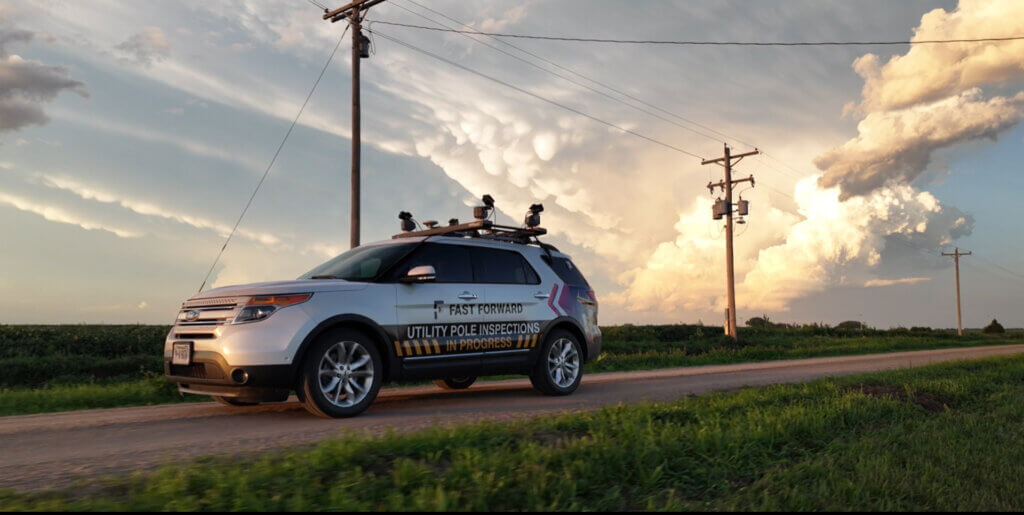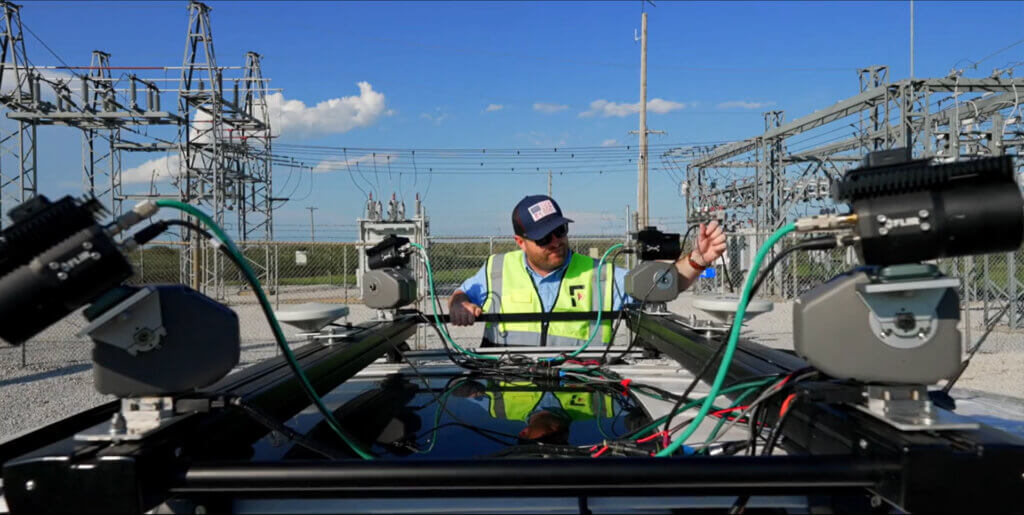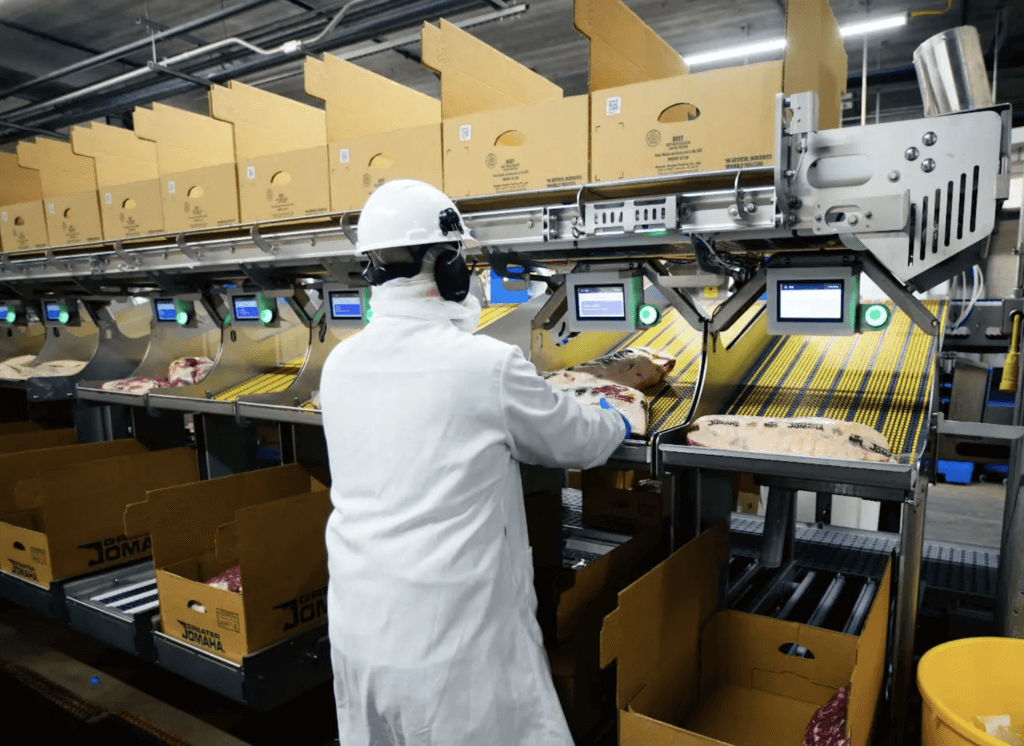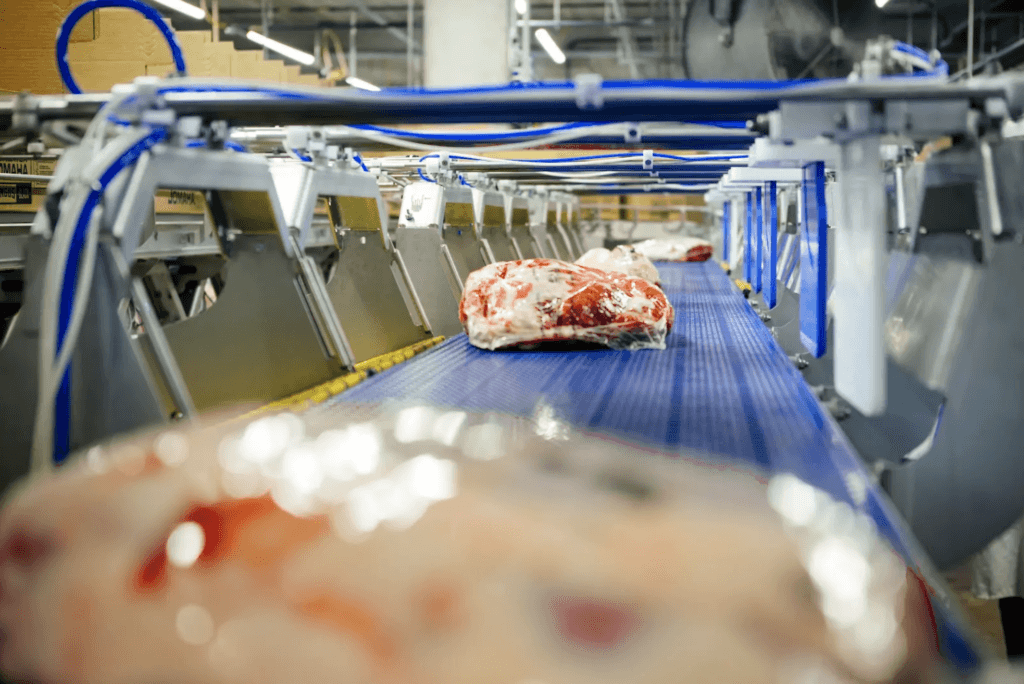
Business Innovation Programs Help Entrepreneurs Turn Promising Ideas into Market-Ready Products

The wildfires raging across California have renewed discussion about how to minimize these devastating disasters. Fast Forward, a small business in Kearney, is using funds from Nebraska’s Business Innovation Act (BIA) Program to aid wildfire prevention. They’re helping utilities inspect powerlines more quickly so that anomalies can be identified and repaired before causing a problem.
“In many areas, it still takes over 10 years for a utility to do a pass of their system,” said Dusty Birge, who founded Fast Forward in 2022. “That excessive window of time is leading to preventable power outages and wildfires.”
The traditional method to inspect distribution lines has involved a two-person crew: one driver and one person manually snapping photos. Fast Forward used a BIA Program grant to build a prototype that would enable one person to do it all—and do it faster.
“We mounted four thermal cameras on the roof of a vehicle,” Birge explained. “Two forward-facing and two rear-facing cameras capture each side of the road, as well as both the front and back of each electrical pole. We then built software, and the associated hardware, for all four cameras to run independently and take photos autonomously while driving down the road without stopping the car.”
The company tested its prototype by driving 1,200 miles of distribution lines. The prototype worked, and its successful demonstration helped the startup secure multiyear contracts from the utilities participating in the pilot program. Using the technology it has developed, Birge said that Fast Forward can accomplish inspections that once took about 10 years in less than a month. With a proven product to sell, the business successfully applied for seed investment funds from the BIA Program. These funds have supported Fast Forward’s rapid expansion. It doubled revenues from 2022 to 2023 and tripled them from 2023 to 2024.
“Without the grants, we probably wouldn’t have got off the ground,” said Birge. “We were trying to get money to go out and build a camera system that hadn’t been invented to solve a problem that nobody thought was possible to solve. It was instrumental we got the grants. Now we have nine employees and are soon to add more.”

What is the Business Innovation Act?
The Nebraska Legislature enacted the Business Innovation Act in 2011 to provide entrepreneurs like Dusty Birge with access to capital in early stages of product development. Startups typically go through an extensive period of research, design, and testing before having a market-ready product. These first years—before a company is generating enough revenue to sustain itself—are often referred to as the “valley of death,” as many ventures struggle to survive them.
BIA programs help businesses bridge the gap from initial development to substantial growth. “One of our main goals is to get them investment-ready,” explained Ben Kuspa, Business Innovation Manager for the Nebraska Department of Economic Development (DED). “We tee up a lot of companies through our BIA Prototype Program,” he added. “We do about 60-90 prototype awards per year at an average award of about $75,000.”
Once a startup has a marketable product, DED collaborates with Invest Nebraska to connect the company with seed funding—both from the BIA Seed Investment Program and from private investors. BIA programs also provide funding for academic research and development that leads to new or improved products. For example, Fast Forward secured BIA Academic R&D Program funding to work with researchers at the University of Nebraska-Lincoln (UNL) to develop a navigation app for its vehicles. The app helps drivers map the most efficient route, and it logs where they’ve already driven. Additionally, the BIA Program assists companies applying for or receiving funding through the federal Small Business Innovation Research/Small Business Technology Transfer initiative (SBIR/STTR Program).

Molecular Trait Evolution: Boosting Production in the Bioeconomy
Dr. Sean Carr earned his Ph.D. in Microbiology from UNL. As CEO of Molecular Trait Evolution (MTE), he is applying research to develop more efficient, cost-effective solutions for biofuel production. “After corn and soybeans are harvested, they often get processed involving heating the crops to really high temperatures, adding in chemicals, letting them cook, and then cooling them back down. All of those steps take time and money,” Dr. Carr explained. “To get the most sugar and oil out of the crops [to make products like ethanol and biodiesel], you need some expensive enzymes that only work in very specific circumstances.”
That’s where MTE is making its mark. Dr. Carr studies organisms living in the some of the harshest conditions on Earth—such as hydrothermal vents on the ocean floor or acid lakes in places like Yellowstone National Park. He has taken genes from these resilient organisms to engineer a unique mixture of enzymes. At near-boiling temperatures, this enzyme cocktail can convert low-value plant materials into higher-value oils and sugars. “Just by dropping in some of these enzymes, we’re able to get about a 1% increase in total ethanol production,” Dr. Carr said.
In addition to boosting ethanol production, the enzymes are longer lasting. “Our enzymes can survive the distilling process, which is hot enough that it usually kills off anything else,” said Dr. Carr. “Instead of having to put in a new batch of enzymes each time, our enzymes can be recycled. This saves a ton of money for ethanol producers, some of which spend $10 to $20 million on enzymes each year.”
An initial BIA Academic R&D grant helped MTE set up an independent lab in the Biotech Connector at Nebraska Innovation Campus. There, the company proved it could produce its enzymes outside of a university lab setting. In late 2024, the company received a second Academic R&D grant, along with seed funding, to scale up production. These funds are also allowing Dr. Carr to hire a senior scientist and research technicians so that he can devote more time to running the business. “We have a prototype, we’ve validated it, and we’ve replicated how it’s going to perform in production while still being in our own lab,” said Dr. Carr. “Now, we’re working to demonstrate it in the field in partnership with local ethanol plants.”
“BIA program funding allowed me to get over those first hurdles that, without startup funding, are kind of impossible to surmount unless you’re independently wealthy,” Dr. Carr attested. “I started this company on a postdoctoral salary. I wouldn’t have been able to take the time and effort to get this company off the ground without these awards.”

Marble Technologies: Solving Labor Shortages in Meat Processing
Marble Technologies (Marble) is a robotics company building automated systems for the meat processing industry. The company originated during COVID, when a group of technology experts in Nebraska came together to study the potential of AI and robotics to mitigate supply-chain disruptions. These disruptions hit the labor-intensive meat processing industry particularly hard.
“Labor availability wasn’t purely a COVID problem,” said Jordyn Bader, Director of Industry Partnerships for Marble. “Labor availability has been a longstanding challenge in the industry. The pandemic just put a magnifying glass on it.”
The Marble team benefited from Nebraska’s strong ties within the beef industry. Through these relationships, they were invited to experience beef processing firsthand. As they toured facilities, they interviewed leaders to determine where new technologies had the most potential to increase labor productivity. Feedback directed them to focus on packaging—specifically sorting packaged products.
With support from BIA prototype funds, Marble created innovative computer vision technology. It’s capable of identifying different cuts of meat (brisket, strip loin, etc.) coming down the line, pulling them off the belt, and redirecting the products to their appropriate location. Marble piloted the technology at one of the largest meatpacking plants in Nebraska. Its success led them to deploy their first commercialized system at the facility in 2024.
Invest Nebraska has supported Marble with BIA Seed Investment funds and connected the company to other sources of venture capital. This has helped the business make rapid process in product development. “We’re really proud of how fast we’ve been able to go from concept to commercialization,” said Bader. “We’ve been very fortunate with the partnerships we’ve had and the feedback they’ve provided,” she added. “It continues to make the work we do better, and I think our growth has been a reflection of that.”
Learn more about Business Innovation Act Programs at opportunity.nebraska.gov/bia/.
To see the economic impact BIA Programs are having in Nebraska, click here.

Distribution channels:
Legal Disclaimer:
EIN Presswire provides this news content "as is" without warranty of any kind. We do not accept any responsibility or liability for the accuracy, content, images, videos, licenses, completeness, legality, or reliability of the information contained in this article. If you have any complaints or copyright issues related to this article, kindly contact the author above.
Submit your press release